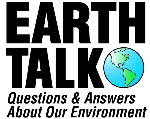See also: Healthy Food Choices Videos Raw Food:
Healthier than Cooked?Dear EarthTalk: Are raw foods healthier to eat than cooked foods?
-- Kris Amitzboll, Coledale, Australia Proponents of raw foods, sometimes called “living foods,” believe that raw foods are much healthier for the body than cooked or processed foods. Followers of diets based wholly or largely on raw foods claim numerous health benefits, including increased energy levels, clearer skin, better digestion, weight loss and reduced risk of heart disease.
A purely raw food diet, as its name implies, is based on consuming only unprocessed, usually organic, whole plant-based foods, such as fresh (or dried) fruits and vegetables, nuts and seeds, beans, grains and legumes, other organic or natural foods which have not been processed, and freshly made fruit and vegetable juices.
According to the Living and Raw Foods website, raw, uncooked foods are believed to contain essential food enzymes which help the digestion process without relying on the body to produce the enzymes that are lost through cooking. It is also thought that cooking (heating foods above 116 degrees Fahrenheit) destroys vitamins and minerals and that cooked foods take longer to digest and tend to allow partially digested fats, proteins and carbohydrates to clog up our digestive system and arteries. In Living Cuisine, The Art and Spirit of Raw Food (available from best-cooking-books.com), raw food chef-to-the-stars Renee Loux Underkoffler argues, “Raw foods make optimal assimilation of nutrition easy, provide pure, clean energy for the body, and do not require a lot of energy for digestion.”
Traditional nutrition experts refute this idea, though the American Dietetic Association (ADA) and others are doing studies regarding the possible benefits of a raw food diet. Claudia Gonzalez, a registered dietitian and spokesperson for the ADA says that eating all raw, all the time, is an “extreme” diet, but acknowledges, “If you eat more raw foods in your diet (without adding calories) that’s always a good thing. Replacing refined, processed foods with raw foods is a healthy move. Eating a few raw meals a week can be great, but it’s important not to go to the extreme.”
Gonzalez, who has studied raw food diets, says it’s hard to eat more than 1,200 calories a day in raw foods. While this might be great for weight-loss, she says, once the weight comes off, that might not be enough to sustain a person’s energy, especially if they are doing physically demanding work.
If you decide to go raw, there are benefits to the environment as well. The lower you eat on the food chain, the less impact you will have on the Earth’s resources. According to certified nutritionist and raw foods advocate Monica Dewart, “100 percent of the waste materials (seeds, peels, etc) of a raw diet are biodegradable and great for composting. This is the ultimate environmentally-friendly diet!”
 CONTACTS: Living and Raw Foods, http://www.living-foods.com; American Dietetic Association, (800) 877-1600, http://www.eatright.org CONTACTS: Living and Raw Foods, http://www.living-foods.com; American Dietetic Association, (800) 877-1600, http://www.eatright.org GOT AN ENVIRONMENTAL QUESTION? Send it to: EarthTalk, c/o E/The Environmental Magazine, P.O. Box 5098, Westport, CT 06881 USA; submit it at: www.emagazine.com/earthtalk/thisweek/; or e-mail: earthtalk@emagazine.com . | 